Respect for Human Rights
- Related ESG :
- S

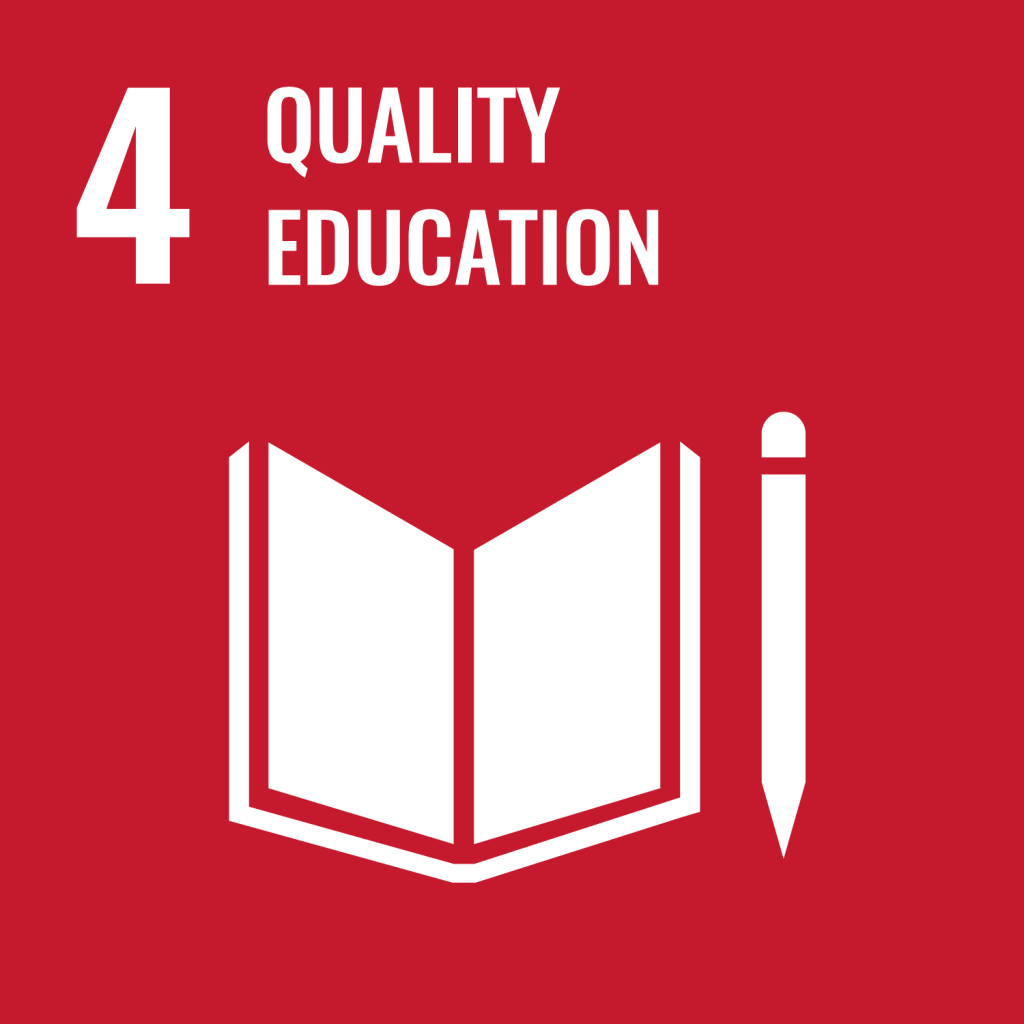
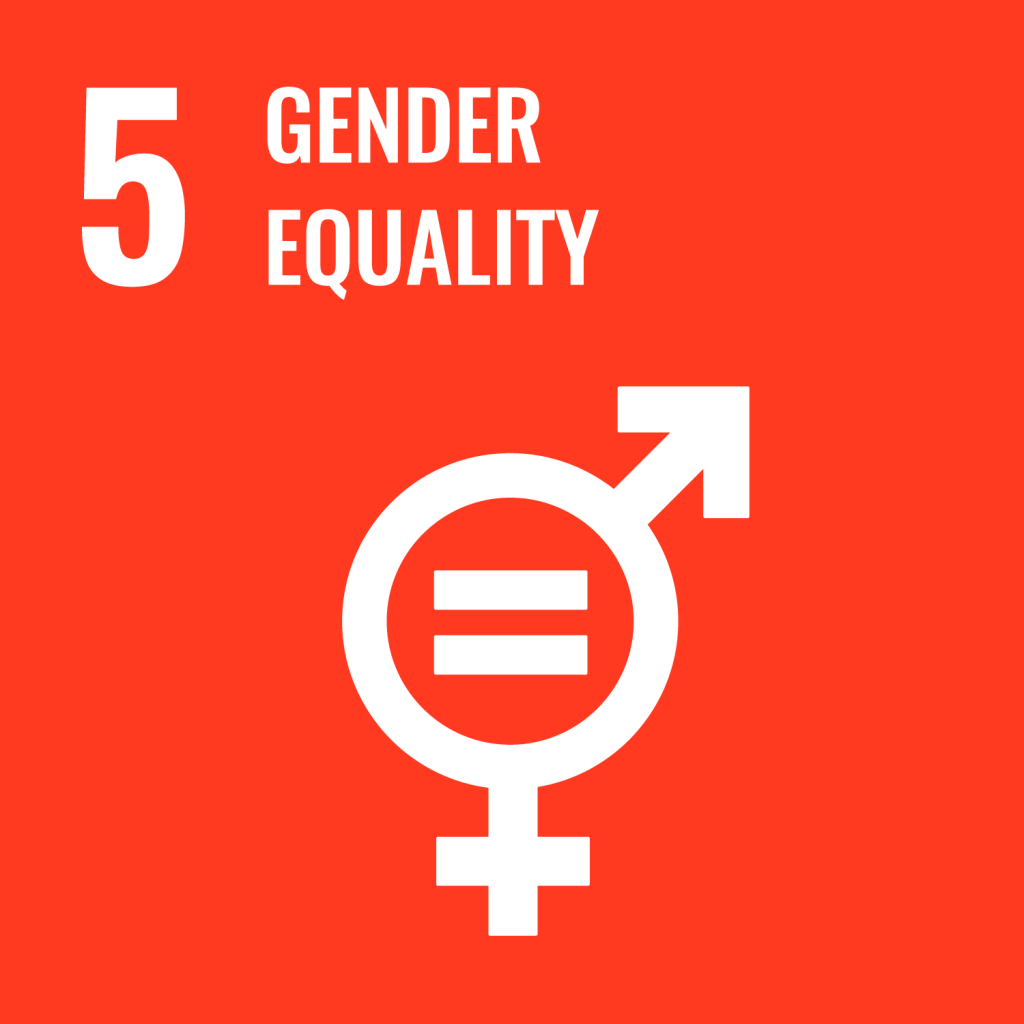
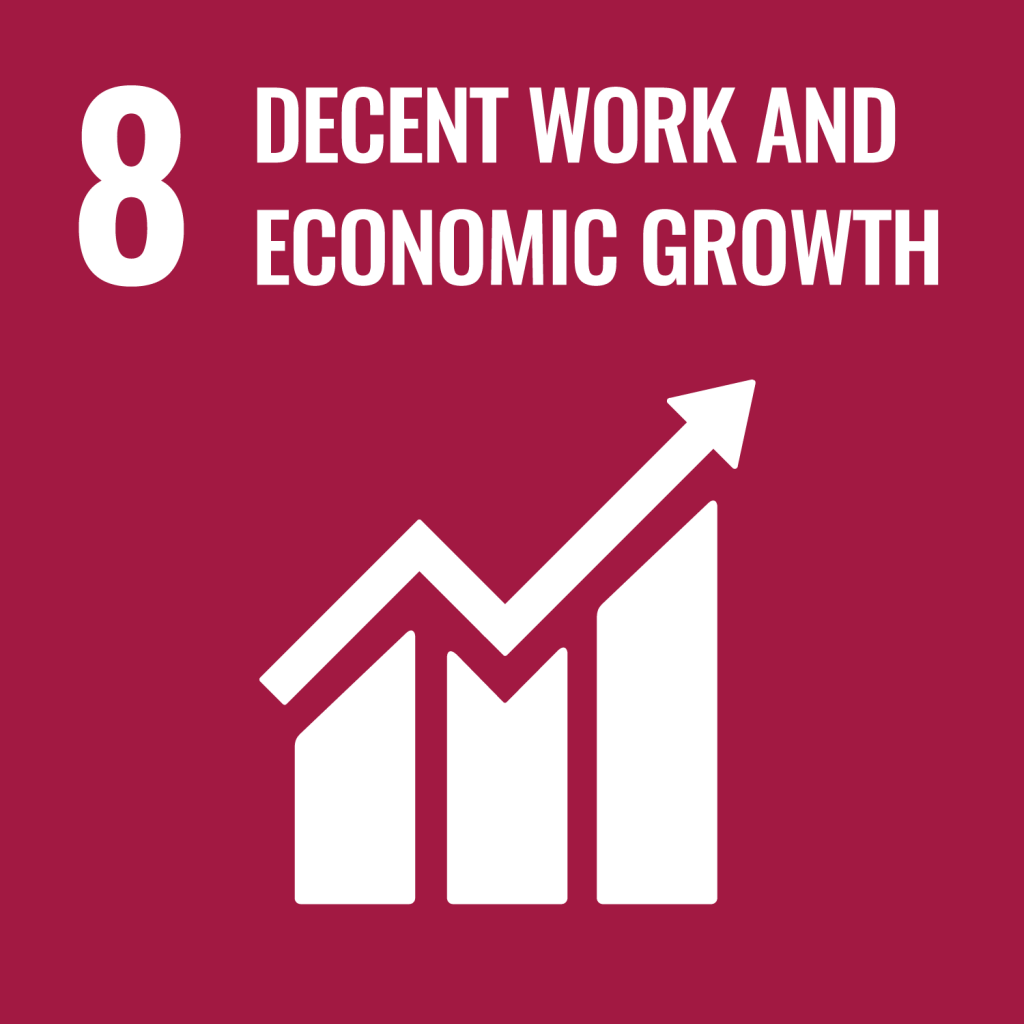
Management approach
Policy and approach
Respecting human rights is essential for Toyobo group to fulfill its responsibilities as a member of society and continue as a trusted company. In this regard, respecting the rights of employees and trading partners, who are important stakeholders for the group, is crucial to enabling them to demonstrate their abilities, and to work with vigor and energy. In recognition of this, we have included “4. Respect for Human Rights” and “6. Active Employee Participation” within the 10 principles of the Toyobo Group Charter of Corporate Behavior. We also support and respect other international agreements relating to human rights, such as the International Bill of Human Rights, the International Labour Organization (ILO) Declaration on Fundamental Principles and Rights at Work, the Children’s Rights and Business Principles, and the UN Guiding Principles on Business and Human Rights.
< TOYOBO Group Human Rights Policy >
Toyobo group defines its corporate philosophy as “Jun-Ri-Soku-Yu” (adhering to reason leads to prosperity) in the corporate philosophy framework “TOYOBO PVVs” and aims to be a group that will continue to create the solutions needed by people and the earth with materials and science. We also uphold the respect for human rights in the TOYOBO Group Charter of Corporate Behavior and Employee Conduct Standards, and are always aware that all individuals are born free and equal in dignity & rights, and fulfills the responsibility to respect human rights in our all activities.
-
Compliance with laws and norms related to respect for human rights
Based on the United Nations Guiding Principles on Business and Human Rights, Toyobo group supports and respects international norms on human rights, including the United Nations International Bill of Human Rights (the Universal Declaration of Human Rights, the International Covenant on Economic, Social and Cultural Rights, and the International Covenant on Civil and Political Rights) which stipulates fundamental human rights for all people, and core labor standards according to the International Labor Organization (ILO) "the ILO Declaration on Fundamental Principles and Rights at Work.
In addition, as a signatory to the United Nations Global Compact, the group supports and respects its ten principles and others.
The group complies with the laws and norms of each country and region in which it conducts its business activities. Where there are differences between internationally recognized human rights norms and the laws and regulations of each country, it will seek ways to maximize respect for internationally recognized human rights norms. -
Scope of application
This policy applies to all officers and employees of Toyobo group. Furthermore, the group seeks the support of all stakeholders involved in its business, products, and services and expects them to work together with the group to respect human rights.
-
Responsibility for respecting human rights throughout business activities
Toyobo group not only ensures that it does not infringe on human rights, but also fulfills its responsibility of respecting human rights by taking appropriate measures to remedy the adverse impacts on human rights that are found in its activities.
-
Human rights due diligence
Toyobo group establishes a system of conducting human rights due diligence in line with the United Nations Guiding Principles on Business and Human Rights. Through this system, the group identifies the adverse impacts on rightsholders* and prevent or mitigate such impacts.
* Stakeholders whose human rights are affected through the corporate activities, such as employees, consumers, and local residents
-
Remediation and relief
If the corporate activities of Toyobo group have caused adverse impacts on human rights or if there are indications or suspicions of involvement in such impacts through business partners or other parties, the group will remedy and relieve the situation through appropriate measures and procedures.
-
Education
Toyobo group strives to reflect this policy in the necessary procedures to root in the entire corporate activities. We educate and train the officers and employees to ensure that this policy is correctly understood and appropriately applied and that our business partners and other related parties also understand the policy.
-
Dialogue
In the process of implementing this policy, Toyobo group appropriately utilizes the knowledge of external experts and specialists on human rights and engage in sincere dialogue with rightsholders.
-
Information disclosure
Toyobo group discloses and reports the status and results of its efforts for respecting human rights and the implementation of human rights due diligence on its website and other media.
This policy was approved at the Board of Directors meeting of TOYOBO CO., LTD. on February 21, 2024.
Established on October 26, 2020
Revised on February 25, 2024
Ikuo Takeuchi
President & Representative Director
CEO & Co-COO
TOYOBO CO., LTD.
Toyobo Group Priority Issues on Human Rights(As of March, 2025)
Toyobo group has identified its priority issues concerning human rights as follows. Based on this policy, it appropriately implements them through the system of human rights due diligence.
These issues will be reviewed accordingly, considering changes in social conditions and other factors.
Cross-Company Issues:
-Forced labor, child labor, human trafficking, poor working conditions, restrictions on freedom of association and collective bargaining rights, inadequate DE&I consideration, inappropriate working conditions and wages, inadequate occupational health and safety, inappropriate working hours, violation of foreign workers' rights, violation of privacy rights, etc.
-All forms of discrimination, such as race, gender, sexual orientation, gender identity, age, place of origin, nationality, language, religion, and disability
-All forms of harassment and bullying
Related Policies
- TOYOBO Group Charter of Corporate Behavior: 4. Respect for human rights, 6. Active employee participation
- TOYOBO Group Diversity Promotion Policy
Structure
Toyobo Group is committed to proactively and systematically respecting human rights. To support this, dedicated staff are assigned to the Human Resources and Labor Relations Department for employee-related matters, and to the Planning Group within the Procurement and Logistics Department for supply chain-related issues.
We are deepening our understanding of international human rights issues that companies must recognize and are preparing for initiatives on human rights due diligence.
The Senior Managing Executive Officer who serves as the Controlling Supervisor of the Sustainability and Corporate Planning Division holds overall responsibility for human rights-related matters.
Targets and indicators
< Targets >
- Toyobo group will carry out initiatives to ensure respect for basic human rights and diversity throughout the entire group, including providing training to foster such respect among employees.
- Through these initiatives, we will aim to be a fair company that is trusted by society.
< Indicators and results >
| Initiatives | Indicator | Target (FY2025) | Result (FY2025) |
|---|---|---|---|
|
|
|
|
Initiatives
Respect for human rights from a global perspective
In the countries and regions where Toyobo Group has business sites, there are various human rights related issues that reflect the specific political, economic and social circumstances. Such issues may include discrimination in regard to employment and work roles, unfair labor practices, forced labor and child labor, infringement of the human rights of foreign workers, and involvement in corruption. For each Toyobo Group business site, it is vitally important to give due consideration to these human rights related issues.
In order to identify the issues that Toyobo Group needs to take into consideration, we are participating in the relevant sub committees of Global Compact Network Japan, alongside other participant companies. We are aiming to deepen our understanding of human rights by gathering information on international human rights issues and other issues that corporations need to pay attention to. Going forward, we will continue to identify human rights related issues that we need to consider at each of Toyobo Group’s business sites.
In FY2025, we conducted a Business and Human Rights survey targeting all overseas Group companies based on the United Nations Global Compact customer questionnaire. The survey confirmed that there were no significant human rights violations such as child labor or forced labor. Moving forward, we will continue dialogues with overseas managers to deepen our understanding of conditions in each country.
| Theme | Details of initiatives |
|---|---|
| Prevention of child labor | We prohibit the employment of persons under the age of 15, or the age for completing compulsory education, or under the minimum employment age set by the country or region whichever is highest in all our business activities. Across all domestic Group companies, we verify the absence of child labor by checking official identification after hiring. |
| Prevention of forced labor | In recruiting personnel, we always require applicants to apply voluntarily and notify them of acceptance only after at least one round of selection. Additionally, at all domestic Group companies, employment conditions are presented at the time of hiring, and employment begins based on mutual agreement with the applicant. |
| Support for living wages | We pay wages in compliance with laws and ordinances that stipulate minimum wages in the countries and regions in which we operate. |
Labor and human rights survey
At our domestic (non-consolidated) business sites in FY2024, we conducted a Labor and Human Rights survey addressing matters including child labor, employment equality, and occupational safety and health. The survey confirmed that there were no violations of human rights laws or ordinances.
For technical intern trainees from overseas, we surveyed implementation and management of technical internship program, as well as compliance with labor-related laws and ordinances, at relevant business sites and Group companies. The survey confirmed that all sites comply with regulations and appropriately manage the internships.
Furthermore, we conducted interviews directly with technical intern trainees from overseas at the relevant business sites and Group companies, as well as on-site inspections. Through these measures, we confirmed firsthand that human rights are being properly respected across all business locations without any issues.
In FY2025, we conducted interviews with the supervising organizations of factories accepting technical intern trainees from overseas regarding recruitment methods in their home countries and the costs and items borne by the trainees themselves, confirming that there are no issues with the current situation.
Additionally, starting from March 2025, we began an annual regular survey targeting technical intern trainees and specified skilled workers.
Enhancing diversity and equal opportunities
Toyobo group believes that personal and organizational growth is achieved through a process of mutual respect among our employees, with their differing work styles, careers, gender, nationality, race, and beliefs, and through cooperation to achieve our shared objectives. We respect different opinions and a wide range of values, and cooperate to achieve ambitious goals together.
Respecting workers' rights
Respecting freedom of association and collective bargaining rights
Toyobo Group respects freedom of association and collective bargaining rights.
We have set shared targets for labor and management to realize TOYOBO PVVs and we strive to build constructive and stable relationships between management and workers. Labor union activity at Toyobo is based on the union shop system,* and all employees that are eligible to join a labor union under the labor-management agreement reached between labor and management join the labor union. Our unions represent all their members and the results of negotiations between management and labor are applied to all members without conditions. However, employees in management and other positions above management level are not eligible to join based on a labor-management agreement, and the union membership rate for all employees is 84.8% (as of the end of FY2025).
- The union shop system is a system whereby all workers employed at a particular workplace are required to join the labor union for that workplace.
Dialogue between management and labor
We arrange repeated opportunities for frank discussion between labor and management aimed at realizing the TOYOBO PVVs, and we promote the building of the foundations needed for every single employee to be able to work with energy and enthusiasm.
Meetings of the Central Management Council, attended by representatives of the labor union headquarters and of company management, are held once a year, and meetings of the Branch Management Councils are held once a year at each of the nine branches in Japan.
The labor union is represented at meetings of the Central Management Council by staff from the union headquarters, and is represented at Branch Management Council meetings by staff from the relevant union branch, while the company is represented by the President at meetings of the Central Management Council, and by the business site manager or plant manager at Branch Management Council meetings. Topics addressed during discussions between labor and management include the operational status of the company, changes in the amount of pay rises, and the working environment.
Decent wages
We comply with laws and regulations regarding minimum wages and equal pay for equal work, etc., stipulated in the countries and regions where we operate, and apply a remuneration system that does not differentiate by gender or other factors for the same position.
Reducing excessive working hours
We are engaged in workstyle reform, so that our employees can work with renewed efficiency and achieve a good balance between work and personal life. We aim to ensure that our employees will take at least one day off every seven days in the future.
Handling of non-compliance with labor standards
| Unit | Scope | FY2021 | FY2022 | FY2023 | FY2024 | FY2025 | |
|---|---|---|---|---|---|---|---|
| Major violations of laws, regulations, or rules | Incidents | Global | 0 | 0 | 0 | 0 | 0 |
| Serious non-compliance with labor standards | Incidents | Total in Japan | 0 | 0 | 0 | 0 | 0 |
| Number of incidents of serious human rights violations | Incidents | Total in Japan | 0 | 0 | 0 | 0 | 0 |
| Compliance-related incidents that resulted in a criminal complaint | Incidents | Total in Japan | 0 | 0 | 0 | 0 | 0 |
Establishment of complaint handling and internal reporting systems
The Complaint Handling Committee, the Compliance Consultation Service, which is an internal reporting system, and the recently opened the LGBTQ+ Consultation Service accept human rights-related consultations and reports. At each business site, members representing both the company and labor are elected to the Complaint Handling Committee that handles requests for consultation from employees concerning issues related to the Equal Employment Opportunity Law.
In order to ensure that employees can use these systems without concern, the name and other details of employees making reports or receiving consultations are kept private and we guarantee that these individuals will not be negatively affected by their action. We also strive to detect and solve human rights issues at an early stage through compliance surveys.
Internal education initiatives
Internal communication of our Code of Conduct and Compliance Manual
Toyobo group has created English and Chinese versions of the TOYOBO Group Charter of Corporate Behavior in order to implement internal education that enables employees around the world to share the same vision.
We use our TOYOBO Group Compliance Manual to familiarize employees with rules and case studies concerning respect for human rights, prohibition of discrimination, prohibition of child labor and forced labor, and protection of personal information.
We also familiarize and educate hiring recruiters on human rights-related cautions to be observed in interviews.
Human rights-related training
Since FY2020, we have been promoting human rights awareness among Group company employees primarily through seminars and training sessions.
In FY2025, we conducted various activities including training for new hires, grade-specific training, lectures, and human rights-themed workshops at each business site, with a total of 792 individuals participating in such activities.
Since FY2024, the Corporate Planning Department, Human Resources and Labor Relations Department, and Procurement and Logistics Department have jointly launched “business and human rights training.” This initiative provides an opportunity to promote awareness of the TOYOBO Group Human Rights Policy and deepen understanding of human rights due diligence.
We are raising awareness of “business and human rights” through various opportunities and expanding these initiatives across Group companies to broaden their impact.
In addition, we have introduced e-learning programs on “business and human rights” to provide employees with the flexibility to participate voluntarily. These efforts aim to foster a workplace environment that nurtures long-term sensitivity to human rights issues, including bullying and harassment.
Business and human rights study session in FY2025
| Months | Instructor | Participant |
|---|---|---|
| June | Corporate Planning Department, Human Resources and Labor Relations Department | Managers of overseas Group companies |
| August | Minako Yoshikawa, Executive Advisor, ASICS Corporation | Business and human rights ambassador for aspiring enterprises |
| February | Mariko Mori, General Manager, DEI Promotion Section, Diversity Promotion Division, Corporate General Affairs Human Resources Group, Kyocera Corporation | Officers and employees |
| February | Corporate Planning Department, Human Resources and Labor Relations Department, and Procurement and Logistics Department | Officers and employees |
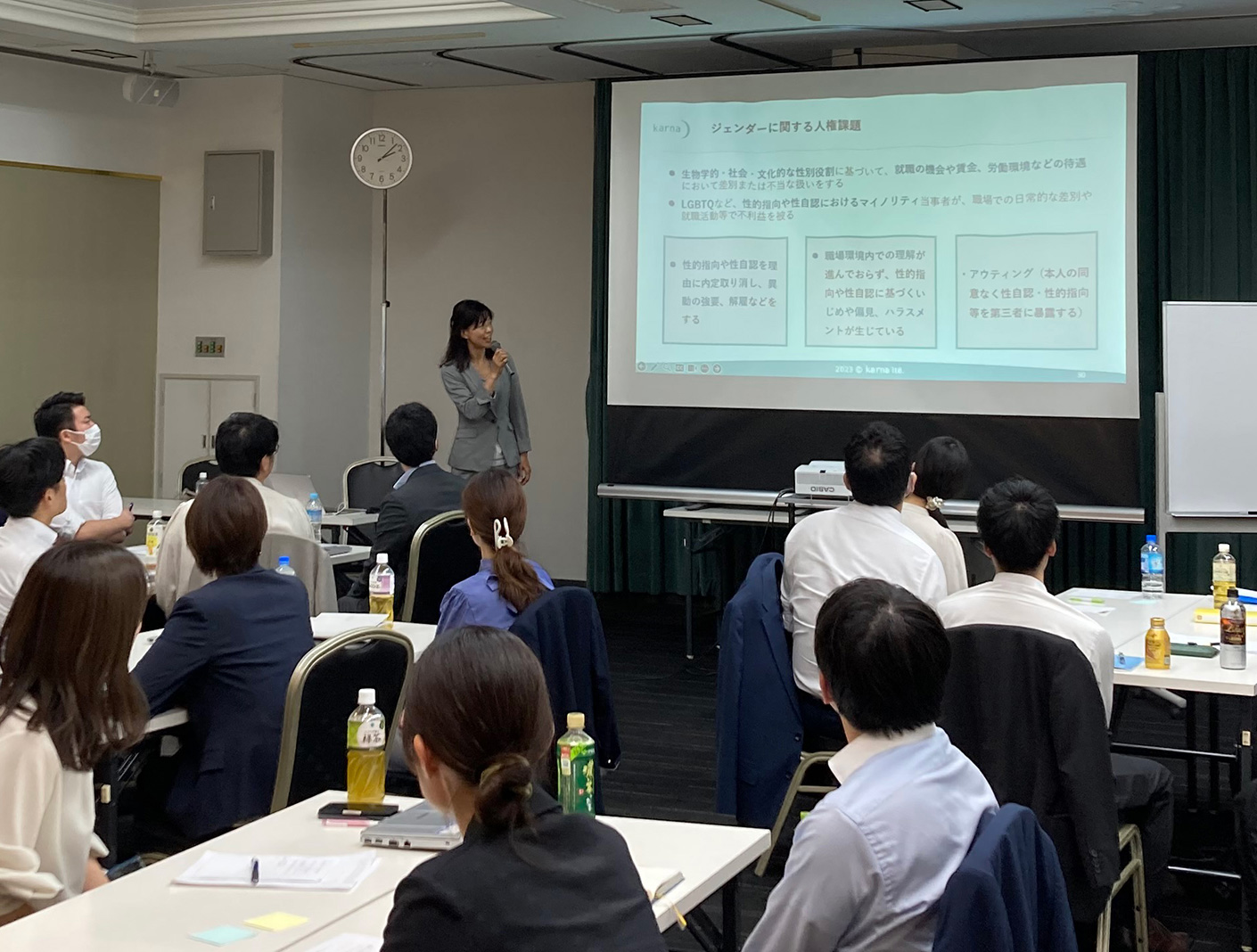
Business and human rights ambassador for aspiring enterprises in Aug. 2024
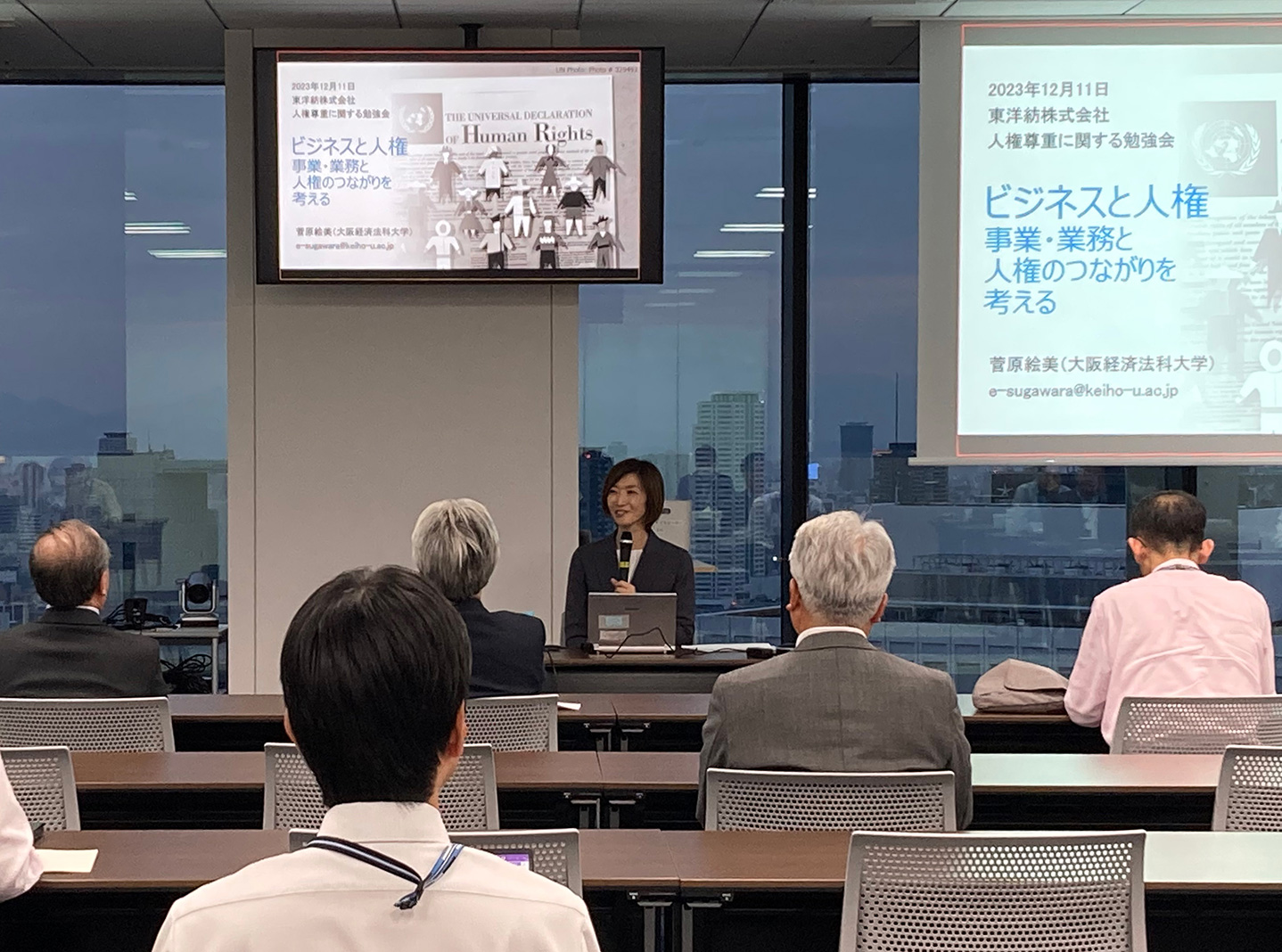
Study session for executives and employees (KYOCERA Corporation) in Feb. 2025
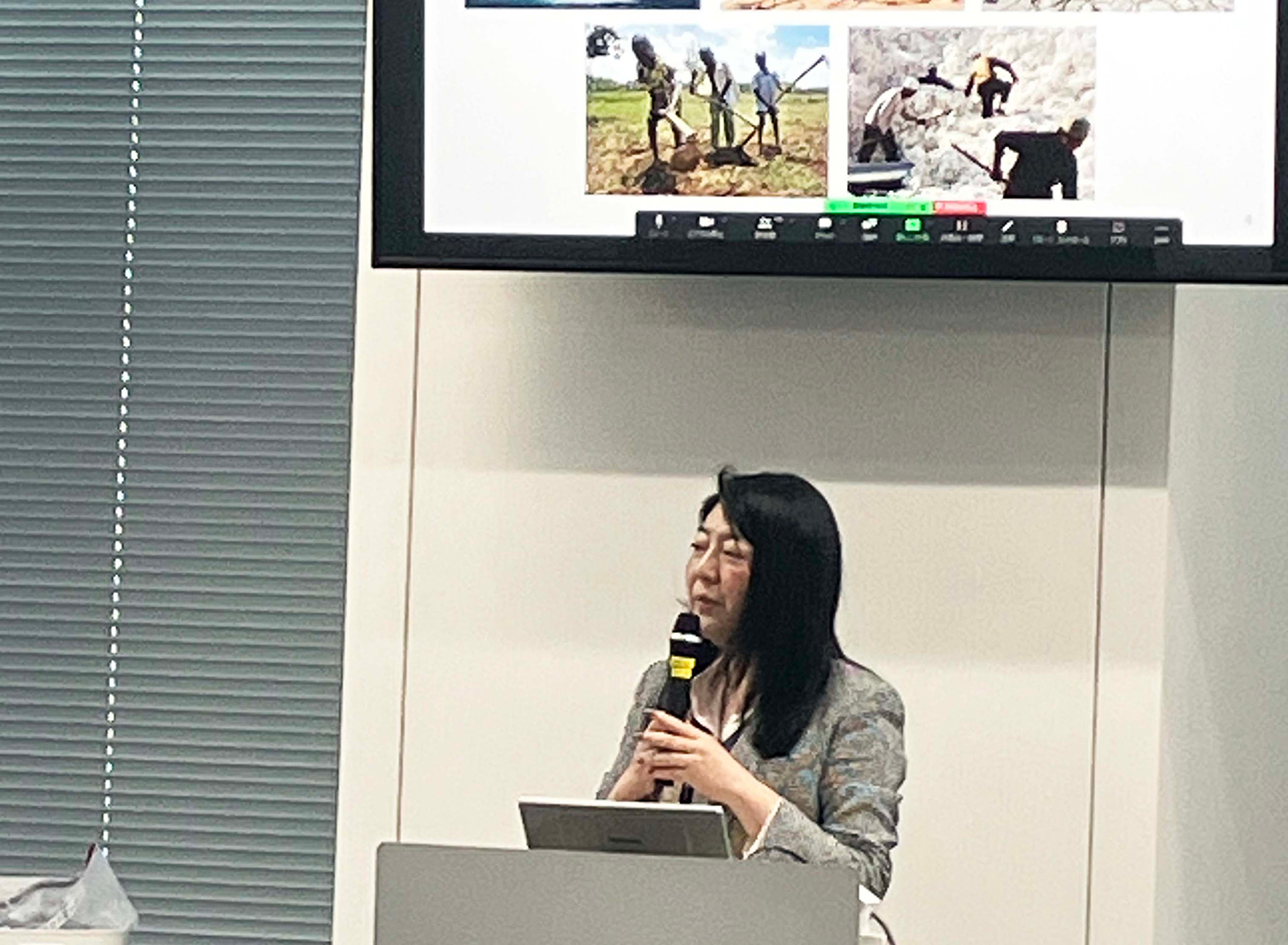
Study session for officers and employees in Feb. 2025
In our compliance study sessions, we addressed “business and human rights” in FY2024 and “harassment (including bullying)” in FY2025.
We have added "business and human rights" to the theme of our compliance study sessions for managers since FY2024. We plan to hold these sessions at 12 group companies, which hold them by the end of the fiscal year.
Participation in the Global Compact Network Japan Subcommittees
We participate in the human rights subcommittees of Global Compact Network Japan, where we engage in learning opportunities alongside human rights NGOs and other participating companies to deepen our understanding of human rights issues and other issues companies should be mindful of.
In FY2025, two members from our Corporate Planning Department’s Sustainability Group completed the “Business and Human Rights Accelerator - Japan Edition” program, deepening their understanding of human rights issues. They are applying this knowledge to enhance our awareness-raising activities.
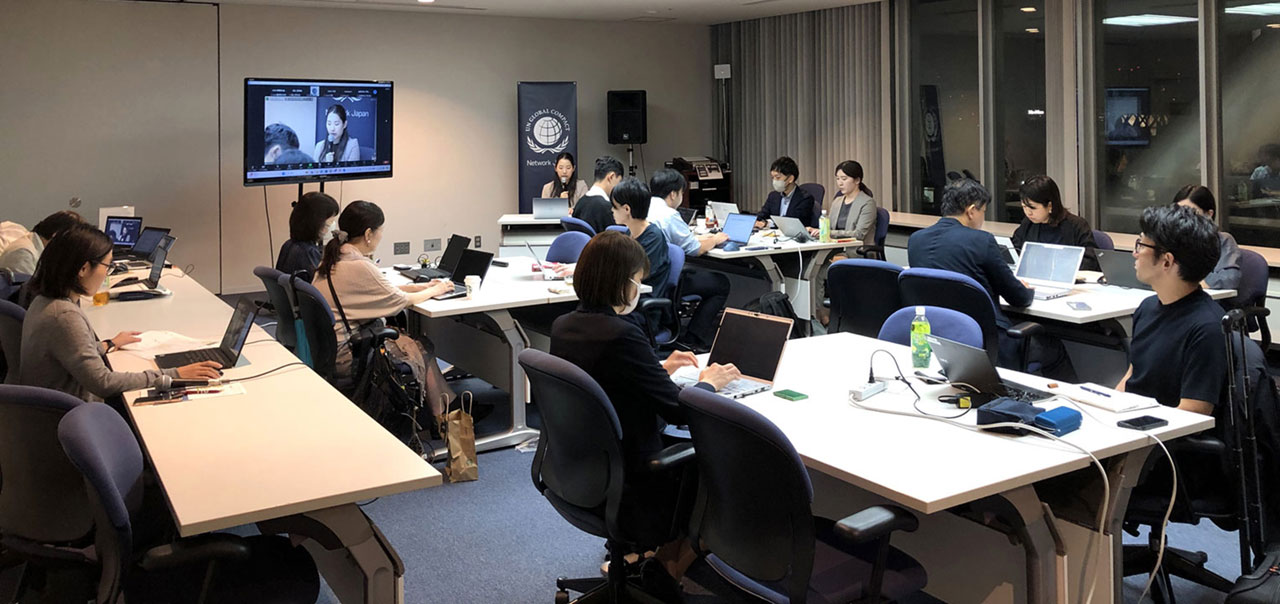
Business and Human Rights Accelerator - Japan Edition ©GCNJ 2024
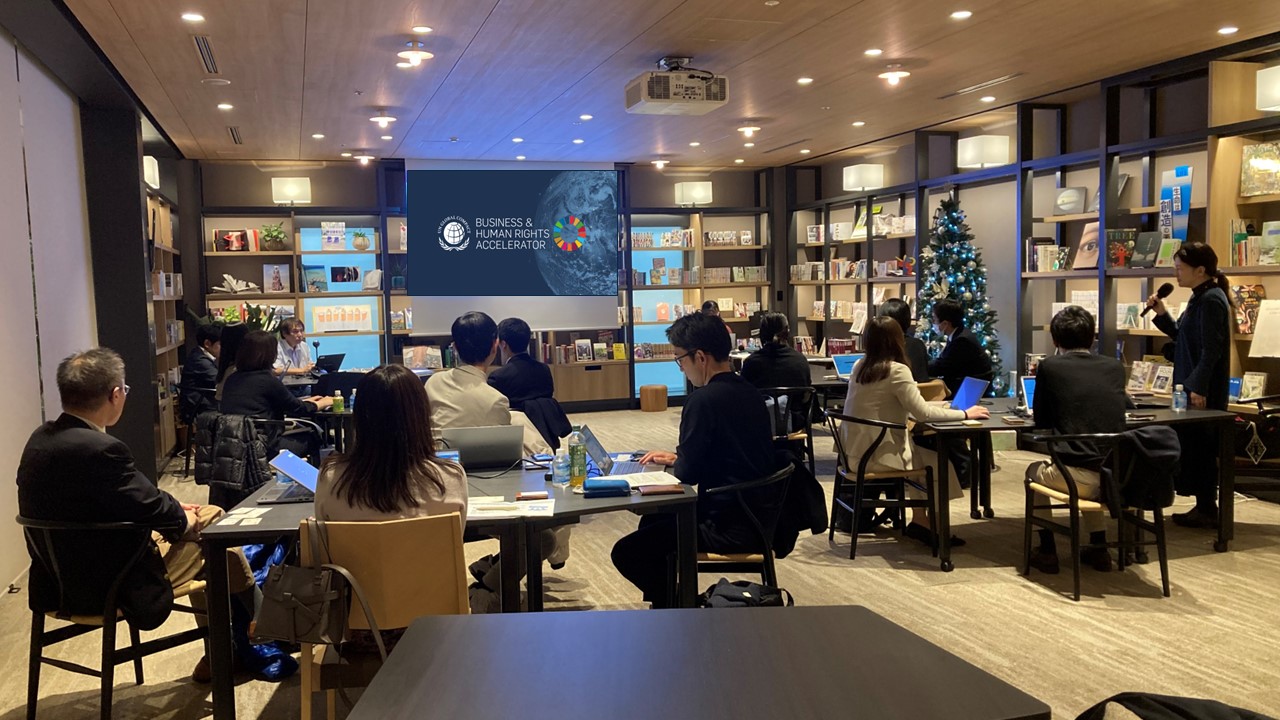
Business and Human Rights Accelerator - Japan Edition ©GCNJ 2024
Respecting human rights in the supply chain
Revision and communication of the CSR Procurement Guidelines
To achieve the SDGs throughout our supply chain, with a particular focus on strengthening respect for human rights and environmental considerations, we revised our CSR Procurement Guidelines most recently in September 2022 and January 2025. By regularly reviewing and updating these guidelines, we respond to the rapidly evolving global environment. The guidelines explicitly require consideration of human rights issues—such as prohibiting child labor, forced labor, and discrimination against all individuals, including LGBTQ+ persons—in the selection of business partners. We have communicated these guidelines to our key suppliers and business partners.
Human rights risk assessment based on the CSR procurement survey
The Company also conducts a CSR procurement survey based on our CSR Procurement Guidelines, targeting our major business partners. We evaluate partners’ human rights initiatives using the human rights-related items in the survey.
After analyzing and evaluating survey responses, we perform appropriate follow-up actions such as onsite dialogues and interviews, to address business partners identified as high risk.
Dealing with new and existing business partners
For new business partners, we obtain a written confirmation of agreement to the CSR Procurement Guidelines at the start of the relationship. For existing partners, we regularly request their cooperation in surveys to conduct risk assessments.
Engagement with stakeholders
Engagement with local communities
To protect the human rights of stakeholders in local areas, in cooperation with government bodies we engage with issues that affect human rights in communities through information exchanges with neighboring residents, community associations, cooperatives, and other parties, as well as steadfast public relations activities. The results of this engagement are of aid in measures to combat noise, odors, wastewater, and other issues.
As an example, our Tsuruga Research and Production Center conducts information exchanges with local community associations and cooperatives once a year. We also provide neighboring areas with advance notice when performing periodic inspections.
Engagement with overseas technical intern trainees
In our engagement with overseas technical intern trainees, we provide support at relevant business sites by preparing materials in their native languages, assisting with official procedures, and addressing daily life consultations. We also hold sessions to listen to concerns arising from differences in lifestyle and respond to them as needed.
Participation in initiatives
We participate in the labor subcommittee meetings of the industry associations, Spinners' Association of Japan and Chemical Fibers Association of Japan. The subcommittee discusses work-related issues (working hours, leave systems, personnel systems, retirement benefits, etc.), including labor standards, and labor issues (e.g., measures against COVID-19 , teleworking and other work styles).
In September 2023, we participated in the declaration for Responsible Business Conduct for the Textile and Clothing industry of Japan by the Japan Textile Federation. This declaration indicates that the company understands the purpose of the Guideline for Responsible Business Conduct for the Textile and Clothing Industry of Japan released by the Federation in 2022 and agrees to promote respect for human rights in accordance with the Guidelines (As of April 2025, 1,112 companies have declared).
In November 2023, the Chemical Fibers Association of Japan established the Human Rights DD Response Committee consisting of the regular members of the association, in which we are also participating. The committee members share information and exchange opinions on human rights issues in the supply chain, including trends of government policy and the Japan Textile Federation, as well as the status of responses at each company, and hold seminars and other events.






